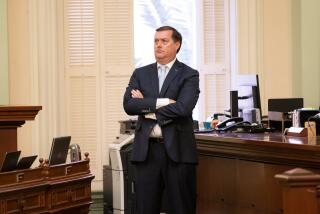William Burkett; Official in Gov. Knight Administration
- Share via
William A. Burkett, a crusading government lawyer and official who fought financial corruption, independent banker and self-styled historian, has died. He was 86.
Burkett, the first Cabinet member named by California reformist Gov. Goodwin J. Knight, died Friday at his home in Pebble Beach, Calif.
Already established for prosecuting bribery scandals in the Internal Revenue Service, Burkett was chosen by Knight in 1953. Over the next five years, the young lawyer served as state director of employment, chairman of the Employment Stabilization Commission, director of the state Manpower Commission, state superintendent of banks, director of the state Department of Investments, chairman of the state Securities Commission and chairman of the state Refugee Relief Commission.
Knight initially named Burkett to the employment post to end fraudulent unemployment insurance payments--one of the governor’s campaign promises. Burkett, who was at the time working as a tax consultant and investigator, had led demands for reform as executive vice president of the Inter-Assn. Unemployment Insurance Committee, made up of 26 employer associations and employers. He claimed that jobless pay fraud was costing the state more than $20 million annually.
Despite criticism from labor groups that Burkett was too much of an enthusiastic cop to be a fair administrator, Burkett vowed “to protect the unemployment insurance fund for the unemployed worker by stopping chiseling.” He soon proposed a series of bills calling for 77 changes in the state’s jobless benefits system.
But when labor leaders continued to demand Burkett’s resignation, claiming he favored employers over workers, Knight made him state superintendent of banks.
Years later, in 1978, Burkett tried to run for governor.
Born in Herman, Neb., Burkett earned a law degree from the University of Nebraska in 1936, the same year he ran unsuccessfully for Nebraska secretary of state. Also an accountant, he began his career as an executive trainee with the Bank of America.
He served in the Coast Guard Reserve during World War II, and then from 1945 to 1950 went to Washington as special agent for the U.S. Treasury Department.
Seasoned in rooting out fraud, he resigned in 1950 to work with U.S. Sen. Estes Kefauver’s committee to investigate bribery of IRS officials in California and Nevada. His work helped lead to the conviction of several major tax evaders and dismissal of a number of IRS employees.
During the Eisenhower administration, Burkett served as president of the National Assn. of Superintendents and Commissioners of Banks. The group nominated him to be chairman of the Federal Deposit Insurance Corp., but he demurred in order to protest what he called “a dangerously undercapitalized FDIC fund.”
Burkett established his own bank, Security National Bank of Monterey County, in 1961. He expanded it to seven Victorian-style branches and introduced such innovations for California as Saturday hours before selling to First Interstate Bank (now Wells Fargo) in 1966.
Never ending his crusade for good monetary practices, Burkett in 1989 founded and became president of the Bank and Savings and Loan Depositors League of America, and testified before the U.S. Senate and House banking committees on bank regulation and reform.
For many years, Burkett headed Burkett & Co. Management Consultants of San Francisco and Los Angeles. Most recently, he served as president and chairman of the board of Burkett Land Co. Inc., founded by his grandfather in 1880 to develop land along new railroad routes in Texas, Kansas and California.
Burkett, the great-grandson of two men who helped draft the California Constitution in Monterey in 1849, gravitated somewhat naturally to an avocation as historian.
He earned his first national recognition as a young man in 1935 when his essay, ambitiously titled “The History of the United States of America 1776-1904,” was chosen from more than 1,000 to be etched on the Mt. Rushmore National Memorial in the Black Hills of South Dakota.
Burkett continued his association with Mt. Rushmore long after President Franklin D. Roosevelt and Gutzon Borglum, sculptor of the monument’s giant presidential faces, honored him at the White House. He went on to found and head the National Historical Foundation for the Preservation of American History Inc., which helped finance completion of the carvings and the hall of records at Mt. Rushmore.
He also served as a trustee and on several committees for the monument, and in 1994 donated $1 million in trust for creation of a 600-acre veterans cemetery and interfaith chapel at Mt. Rushmore.
“My purpose,” he said, “is to help correct the disgraceful situation concerning the burial of our nation’s veterans of the armed services who may not find space in national veterans cemeteries.”
Burkett was a founder of the American Veterans of World War II and served as state commander and national vice commander of the organization.
He was a life member of the Society of California Pioneers and was active in the Monterey History and Art Assn., the Monterey County Historical Commission and the Sons of the American Revolution.
Widowed in 1976 by the death of his first wife, Juliet, Burkett is survived by his wife, Nancy Lofton Morrow Burkett; three children, two stepchildren and eight grandchildren.
Services are scheduled today in Monterey. The family has asked that memorial contributions be made to the Community Hospital of the Monterey Peninsula, Box HH, Monterey, CA 93942.
More to Read
Get the L.A. Times Politics newsletter
Deeply reported insights into legislation, politics and policy from Sacramento, Washington and beyond. In your inbox twice per week.
You may occasionally receive promotional content from the Los Angeles Times.










